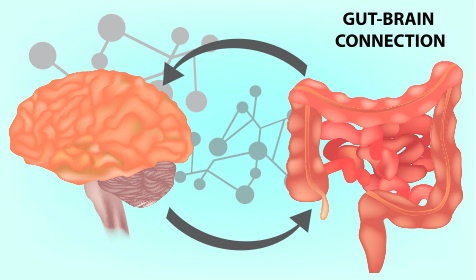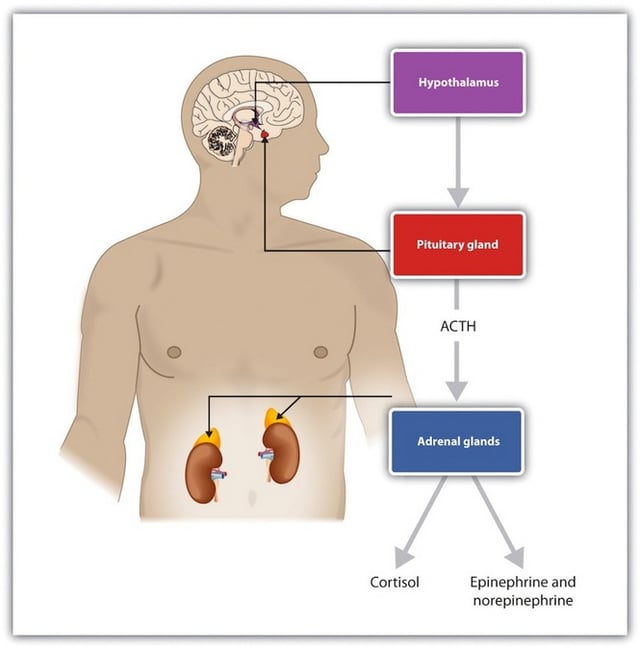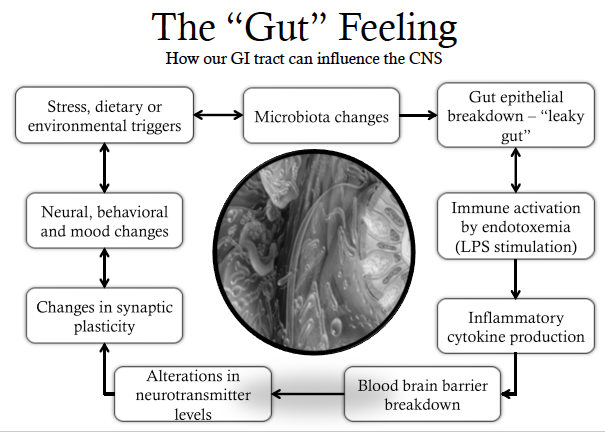THE ROLE OF A HEALTHY GUT IN HEALTHY BRAIN FUNCTION
A large body of evidence is accumulating to support a role between healthy gut function, neural development and function of the central nervous system. The microbiota present in the gut should be considered an inner organ with functions similar in importance to any other organ present in the body. Disruptions in this “organ” may alter many things including central nervous system function, contributing to ADHD, anxiety, depression, chronic pain and a host of other maladies. [2]
Interesting Facts about the Gut
The human gut is sterile at birth, but is quickly colonized. By one year of age, it looks similar to that of an adult profile, although it is still unique to that child. Total adult load is estimated at 1,800 genera, 40,000 species, 1-2kg in weight, 100 trillion in number and possesses 100 times the genes found in the human genome. It is the equilibrium of the microorgansims that is important and what you eat and the kind and amount of toxins, including antibiotics affect the gut microbiota.
Here is a great video that explains the importance of what you eat as it affects the gut:
Gut-Brain Axis Components
The gut-brain axis includes the following components:
- Central Nervous System (CNS) which is comprised of the brain and spinal cord
- Neuroendocrine system (system which creates and montors our hormones)
- Neuroimmune system (system which patrols our body for foreign invaders and rogue body cells (cancer, etc.)
- Sympathetic nervous system (SNS) (our "fight or flight" 'automatic' nervous system)
- Parasympathetic nervous system (PNS) (our "rest and digest" 'automatic' nervous system)
- Enteric nervous system (the nervous system that resided in and controls our gut, also known as the "second brain" of the body)
- Intestinal microbiota (the wide variety of microbes that inhabit our digestive tract)
It is through this bidirectional relationship that signals from the brain can influence the gut and visceral messages from the gut can influence brain function.
The known gut-brain axis influences of the microbiota on the host include:
- Regulation of the mucosal immune system (intestinal immune system "army")
- Gastrointestinal motility (movement of the food through the gut)
- Epithelial barrier function (keeping the gut from being "leaky")
- Digestive and host metabolism support
- Prevention of colonization by pathogen (keeping the bad bugs at bay)
- Psychopharmacology (chemistry of the brain)
The effects of bacteria on the CNS is critical and begins very early in life. Research shows that germ-free mice demonstrate an exaggerated response to mild stress (high corticosterone and ACTH secretion - whic are considered stress hormones). Researchers and medical personnel call the areas of the brain and body that respond to stress as the hypothalamic-pituitary-adrenal axis or HPA axis. The target gland in the axis is the adrenal gland, which produces the stress hormones after being stimulated by the pituitary gland in response to brain perceieved stresss. In the referenced study, the exaggerated stress response was corrected by colonization of the gut by pathogen-free bacteria from other control mice used in the research study. This same study showed that microbial content of the gut is critical to the development of an appropriate stress response later in life and that there is a critical window where colonization must occur to ensure proper HPA axis development. [2]
Microbiota and its effects on the CNS
The most obvious connection is in patients with hepatic encephalopathy, which is a stable form of neuropsychiatric disorder, that usually presents with external precipitating factors. In other words, the effect on gut dysfunction causing brain dysfunction with this disorder is purely from the liver disease. Patients in hepatic failure often develop Impaired cognition, tremors, dementia and even coma. Treatment is an oral, non-absorbed antibiotic which works to reduce urease producing bacteria and therefore ammonia production and other neurotoxins. [3]
How Dysfunction In The Gut Impacts The Brain
In basic terms, unwanted materials from the gut make there way into the blood stream via a damaged gut wall and in turn the barrier between the blood stream and the brain is also breeched, leading to unwanted chemicals in the brain's blood supply. Think of the gut-blood barrier and the blood-brain barrier as the screens in your window frames at your house. Normally the screens will allow air to flow into and out of your home as desired. Secondly the intact screens will keep unwanted "bugs" outside such as flies and mosquitoes, etc, as well as keeping rover or the cat inside. When a screen has a defect, such as a tear or hole, then bugs and critters can come into your home and the family pets may see their way to enlarge the hole to escape to the outside world.
In my metaphor the chemicals that make their way into the brain are what trigger several types of runaway chemical processes that disrupt the normal electrochemical functions of the brain, thus causing a variety of health challenges.
For the technically oriented reader, here is an image that explains how the gut impacts the brain:
- Lipopolysaccharides (LPS) – molecules present on the surface of gram-negative bacteria that elicit a strong immune response.
- Cytokines – messengers used by the immune system to communicate with itself and other parts of thebody including the CNS. Cytokines can be inflammatory, anti-inflammatory or regulatory.
Factors that are known to cause the gut barrier to fail
Several known factors will contibute to failure of the integrity of the gut barrier and thus lead to health challenges that we often associate as brain or neurological disorders. [4] Here is a short list to consider. Simple healthy lifestyle choices can be adopted to correct the majority of them:
- Stress
- High fructose in the diet
- The Western diet high in bad fats and sugar
- Nutrient deficiencies, including magnesium, zinc, omega 3 fats, and vitamin D
- Lack of exercise
- Overuse of antibotics and non-steroidal antiinflammatory medications
- Food allergies and intolerances
In summary, your gut and brain are super important to keep in good shape if you want to live a healthy life, one with the least potential for developing health challenges. If you would like some professional help, you can request a case review.
Always remember one of my mantras., "The more you know about how your body works, the better you can take care of yourself."
For more details about the natural approach I take with my patients, take a look at the book I wrote entitled: Reclaim Your Life; Your Guide To Revealing Your Body's Life-Changing Secrets For Renewed Health. It is available in my office or at Amazon and many other book outlets. If you found value in this article, please use the social sharing icons at the top of this post and please share with those you know who are still suffering with chronic health challenges, despite receiving medical management. Help me reach more people so they may regain their zest for living! Thank you!
ALL THE BEST – DR. KARL R.O.S. JOHNSON, DC – DIGGING DEEPER TO FIND SOLUTIONS
Sources:
1. Clin Ther. 2015 May 1; 37(5): 984–995. https://www.ncbi.nlm.nih.gov/pmc/articles/PMC4458706/
2. J Physiol. 2004 Jul 1; 558(Pt 1): 263–275. https://www.ncbi.nlm.nih.gov/pmc/articles/PMC1664925/
3. Hepatogastroenterology. 1998 May-Jun;45(21):900-4. https://www.ncbi.nlm.nih.gov/pubmed/9684155
4. Curr Pharm Des. 2016; 22(40): 6076–6086. https://www.ncbi.nlm.nih.gov/pmc/articles/PMC5506689/






